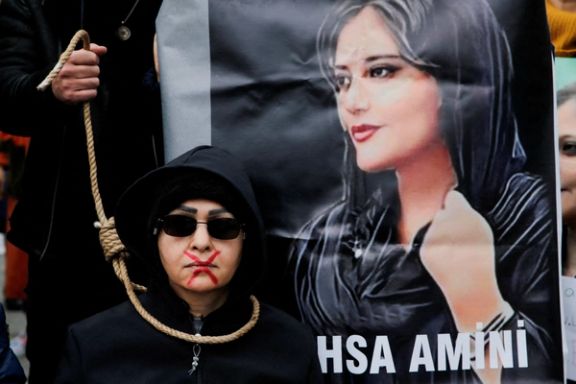Iranian Regime Maintains Tight Security Amid Ongoing Tensions

There were scattered protests Sunday in Iran’s western city of Hamedan, amid continued crackdown, tension and the heavy presence of security forces in major cities.

There were scattered protests Sunday in Iran’s western city of Hamedan, amid continued crackdown, tension and the heavy presence of security forces in major cities.
Videos posted on social media show groups of protesters chanting “Down with the Islamic Republic” and “I’ll kill the ones who killed my sister [Mahsa (Jina) Amini]”. The sound of gunshots can be heard in one of the videos, but casualties have so far not been reported.
On Saturday, marking the anniversary of Mahsa (Jina) Amini's death, which ignited nationwide protests last year, people took to the streets. However, only small groups of young men and women, or individuals, managed to chant anti-government slogans in certain cities like Rasht in northern Iran and the central city of Arak when they had the opportunity.
Security forces on foot and on motorbikes on Saturday managed to prevent protesters from starting nearly everywhere, violently breaking up groups of more than two or three people. In some areas they used violence indiscriminately and made random arrests.
"It was crucial for the regime to maintain strict control on the anniversary and prevent the emergence of new protests," said a political analyst in Tehran who requested anonymity when speaking to Iran International. "The government would have resorted to violent crackdowns had large groups of protesters managed to gather, which could have further fueled more protests. Additionally, it would have heightened international pressure on the regime," he added.
Security forces’ heavy presence on the streets which some on social media refer to as “martial law” continued in many large and small cities including the capital Tehran on Sunday.
“There was no need for so many preventive measures on the anniversary if last year’s protests were only a temporary problem [as authorities claim],” prominent reformist politician and commentator Abbas Abdi said in a commentary he published on Telegram. News websites and print media in Iran did not carry anything even remotely related to the anniversary of the protests.
Hundreds of social media and other activists, ordinary citizens as well as several family members of the victims of last year's protests have been targeted by security bodies in the past few days.
Mahsa (Jina) Amini’s father, Amjad Amini, was detained Saturday morning and released a few hours later. The family had announced on social media a few days earlier that they were planning to hold a ceremony at her graveside as tradition dictates but it appears that her father's detention altered the family’s plans.
Other detainees included people from all walks of life such as several Kurdish citizens in western provinces, two Baha’i citizens in Esfahan (Isfahan), and three public figures in the northeastern Golestan province.
A video posted on social media Sunday showed family members of some of the detainees who had gathered outside a police headquarters in Tehran being beaten by the police.
Rahim Jahanbakhsh, Chief of Police of the West Azarbaijan Province, told the media Sunday that 137 social media activists were arrested in his province alone. “They tried to mislead the public by their content, photos and videos and some of them wanted to incite riots,” he said.
Several actors and other artists who are known for supporting the protesters’ cause, overthrowing the regime, including the well-known actress Hanieh Tavasoli, were also detained in the past few days.
Tavasoli was arrested close to midnight at her home Saturday and released on bail Sunday. Tavasoli’s social media accounts were deactivated a few minutes after her arrest.
Many other activists and ordinary citizens were called in by intelligence bodies for questioning. Among them were two dissident Sunni clerics from two towns in the southeastern Sistan-Baluchestan Province and Rojan Maleki, a sixteen-year-old girl from a village near the Kurdish city of Marivan who was questioned for writing graffiti.